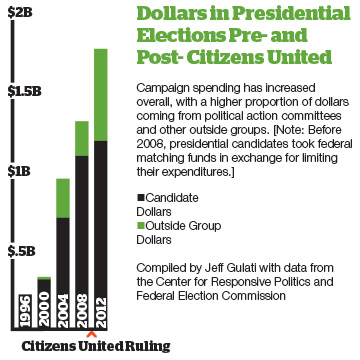
In today’s political landscape, successful campaigns are no longer just about knocking on doors and handing out bumper stickers. Donors, staff and candidates expect campaigns to operate like the businesses they are - with metrics to prove return on investment and with great transparency to prove where money comes from and where it goes.
According to data from the Federal Election Committee (FEC), in the last election  cycle, more than $6 billion was funneled into federal races - for the White House and Congress - by candidates, parties and outside groups focused on influencing policy outcomes in Washington, a number that at one time seemed unfathomably high.
cycle, more than $6 billion was funneled into federal races - for the White House and Congress - by candidates, parties and outside groups focused on influencing policy outcomes in Washington, a number that at one time seemed unfathomably high.
However, the totals for 2016 are likely to be much greater. For example, Hillary Clinton’s campaign told media outlets it would need to raise $2 billion to have any chance at getting her elected, and that was back in May. Jeb Bush for example, raised more than $155 million only to compete in three states’ primaries. This is not small change. This is big business.
But despite how big the business of politics seem, campaigns are increasingly being run like start-ups, focusing heavily on things such as data analytics, social media, branding, fundraising and building a team from the ground up.
With the campaign “industry” making drastic changes, what are the necessary strategies for success?
Bentley President Gloria Larson joined Bloomberg Radio’s Carol Massar and Cory Johnson, along with guest experts, to discuss how campaigns are functioning as businesses and what college students can learn from these operations.
Measurement is critical
Polling and opinion research are vital tools in both politics and business. In political campaigns, polling is used not only to understand how many people will likely vote in a certain way, but it enables candidates to determine which messages or facts will do the best job persuading voters to vote for them. In today’s 24/7 media environment, opinions can turn on a dime, and campaigns need to be able to capture this and adjust accordingly to ensure a win on election day. Whether it is working to strengthen a company’s brand image, position itself as a leader in a specific industry or working to persuade consumers to support a specific position, political campaigns utilize many of the same tools as corporations.
- Jen Robbins, CEO, Anderson Robbins Research
Understanding business fundamentals gives you an edge
For any college student, in order to have the best understanding of how campaigns are waged and elections are won, it really helps to have a foundation in business, marketing, economics and even accounting and finance. Part of my course at Bentley this semester is organized around the different functions of a campaign from the ground up, starting from how the candidates become candidates in the first place. We look at how campaigns organize a staff, raise money and develop a message, a process that is not all that different from studying start-ups in the business world.
- Jeff Gulati, political science professor, Bentley University
To have the best understanding of campaigns, it helps to have a foundation in business– Prof. Gulati
TWEET THIS
Big money does not guarantee big success
Campaigns are expensive and if there is one thing I’ve seen, it’s that big money doesn’t always equal big success. Successful candidates are smart about how they spend their money and integrate their funding strategy with the rest of the campaign. From a business perspective, a political campaign is much like a one-day product sale, but with much stricter consequences since there’s only one day (election day) to make the sale. This requires even more extreme planning and strategizing because “sales” the day after do not help candidates.
- John Walsh, founder and principal, Walsh Strategies, political strategy expert
Learn more about Bentley's partnership with Bloomberg Radio.

